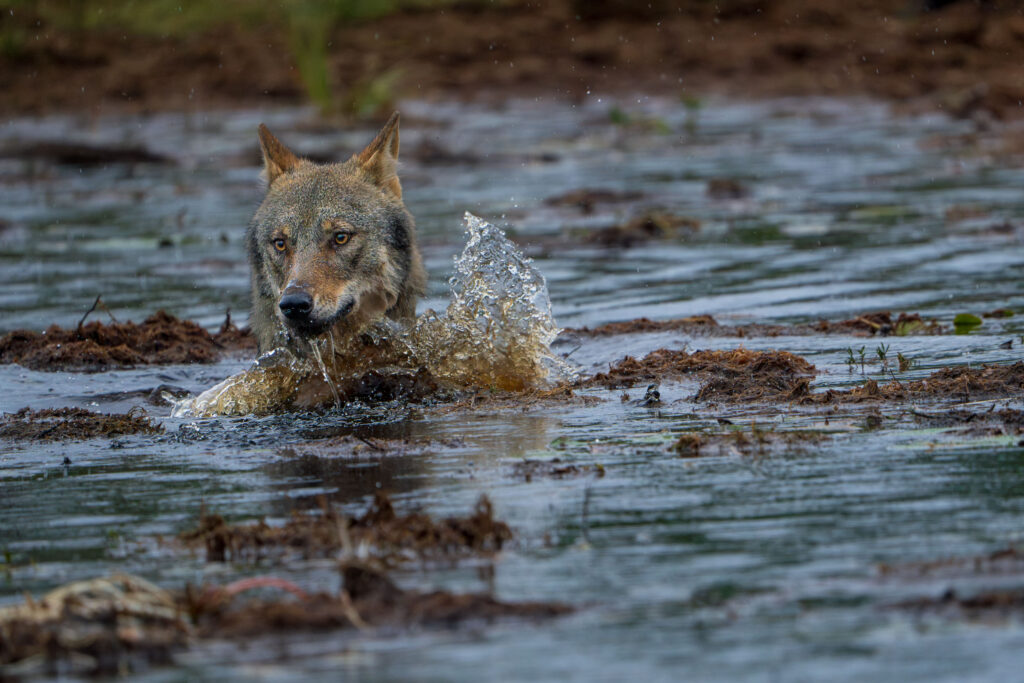An appeal to the Commission to bring the Swedish infringement case on wolves before the European Court of Justice now
The EU is founded on the rule of law and its Member States are obliged to transpose and implement EU law. Despite its prominent mission as the Guardian of the EU Treaties, the European Commission has for the past 14 years failed to act on Sweden's annual culling of its wolf population in obvious violation of EU law.
In response to a complaint by Swedish environmental organizations, the Commission opened an infringement case against Sweden in January 2011 after the first extensive hunt of wolves in 2010. The infringement procedure resulted in two reasoned opinions (a formal request to comply with EU law) from the Commission, the last one in 2015.
Nonetheless, Sweden is ignoring the requirements of the Habitats Directive and continues hunting its small and endangered wolf population. Despite Sweden’s non-cooperation and severe mismanagement of the wolves, the Commission has refrained from referring the case to the European Court of Justice (CJEU), the anticipated next step when Member States do not adjust after due warning. In the final phase, the Member State must comply with the court´s judgment – if the court has ruled against it.
The Swedish wolf case, once one of the most high-profile cases in DG Environment, has now been pending for well over a decade. It has neither been closed nor forwarded to the European Court of Justice for a final legal assessment by the sole juridical body in the EU having the mandate to interpret European law.
The absence of Commission legal action made it possible for Sweden to establish a systemic hunting practice of its wolves, which completely obliterates every chance for the population to ever reach Favourable Conservation Status (FCS), as mandated by EU law. FCS is a legal measurement to guarantee a population’s health - and to attain Favourable Conservation Status is the utmost objective for all threatened populations listed in the Habitats Directive.
The Commission´s failure to act is remarkable since both reasoned opinions clearly underline that Sweden for several reasons is in breach of the Habitats Directive. The last reasoned opinion also questioned Sweden's unexpected claim that its wolf population inexplicably had reached FCS at as few as 270-300 wolves. A well-founded observation.
Aggravated situation for wolves in Sweden
The situation has now become even more critical. The Swedish government plans to further decimate the population from an already precarious 300 individuals to just 170 wolves. The scientific verdict is clear: an isolated, genetically impoverished wolf population of just a few hundred individuals cannot be viable as required for FCS. And obviously, even less so at 170 wolves which would aggravate the already ongoing genetic erosion and threaten the survival of the entire population.
Swedish national courts never rule against the extensive licensed wolf hunts since a 2013 political reform, in spite of innumerable legal appeals throughout the years. Noteworthy is also that Swedish courts never take any wolf case to the European Court for a preliminary ruling, as several other national courts have done in recent time, notably Finnish, Austrian, Spanish and Estonian courts. Consequently, national legal avenues in Sweden have failed. Only the Commission can now enforce EU law — by referring Sweden to the Court.
It is about time to ask publicly why the infringement case neither has been taken to the CJEU nor been closed for the past 14 years. Neither has happened and no explanation has been given by the Commission bureaucracy. This legal paralysis has serious consequences. First, it weakens the Commission’s credibility as the EU’s legal enforcer. Second, it sets a dangerous precedent in that Member States can openly flout EU law without consequences. And third, it imperils the survival of one of Europe’s most iconic apex predators in the high north.
Having been trusted as the guardian of European environmental law, which includes the protection of wildlife, the Commission has now turned itself against Europe´s wolves. Aggravating the situation is the Commission’s controversial proposal to downgrade the legal “Strict Protection Status” of all wolves across Europe, irrespective of whether their individual conservations status is bad, really bad or worse (such as in the case of Sweden).
The proposal is now awaiting a swift voting procedure in the European Parliament and the Council, a process evidently dodging the requirement for a unanimous vote as set by article 19 in the Habitats Directive. The consequence of downgrading protection is equal to opening up for almost unregulated wolf hunting in Europe, which is bad for all, but particularly devastating for Swedish wolves.
Accordingly, it is urgent for the Commission to act on Sweden. Needless to say, the Swedish case must be judged by the EU court based on existing legislation in force during the alleged offenses, i.e. recurrent hunting of a “Strictly Protected Species”.
Should this not be enforced, the Commission would misuse its discretionary powers and favour Sweden´s non-compliance without regard for other Member states having been convicted by the CJEU on wolf hunting (i.e. Finland, Spain and Austria) based on the current strict rules. An unwarranted special treatment of Sweden would seriously undermine European citizens’ and Member States´ trust in the application of the rule of law in the EU, which is the very foundation of the entire EU-project.
Favourable conservation status is still required
Also, regardless of whether the Commission´s proposal is adopted, one legal requirement remains unchanged and that is that FCS must be reached before legal hunting can take place. This condition is of paramount importance in EU legislation and Sweden's much contested and scientifically irrational claims about FCS for wolves must be legally scrutinized - taking into account the effects of long-time extensive hunting - no matter which rules apply.
The cost of inaction is far greater than the loss of Sweden’s wolves. If the Commission allows Sweden to ignore EU law without consequences, it opens the door for other Member States to do the same — whether on wolves, habitat protection, or other areas of EU environmental legislation. Rule-breaking, once tolerated, becomes contagious. The result? A patchwork Union where common laws are no longer common, and environmental standards are undermined by political convenience.
Such an outcome would strike at the heart of the European project — one based on legal certainty, equal treatment, and shared responsibility. The wolf issue is not a minor national matter. It is a test case for whether the EU’s legal foundations still hold when politically inconvenient. How would a failure to act now on Sweden even remotely match the Union’s commitment to protecting and restoring biodiversity, as recently agreed in the Kunming-Montreal Global Biodiversity Framework?
We invoke our right to a fair and impartial trial of the Swedish wolf case in the European Court of Justice and appeal to the Commission to act urgently and take the Swedish case before the Court now.
By Ann Dahlerus, Senior advisor to the Swedish Carnivore Association, Beatrice Rindevall, Chairperson, Swedish Society for Nature Conservation, and Magnus Orrebrant, Chairman, Swedish Carnivore Association
Note: The Swedish Society for Nature Conservation (SNF) and the Swedish Carnivore Association filed the appeal on the Swedish wolf issue in 2010 and have cooperated on the case since then. The SNF is largest environmental organisation in Sweden with over 200,000 members.


